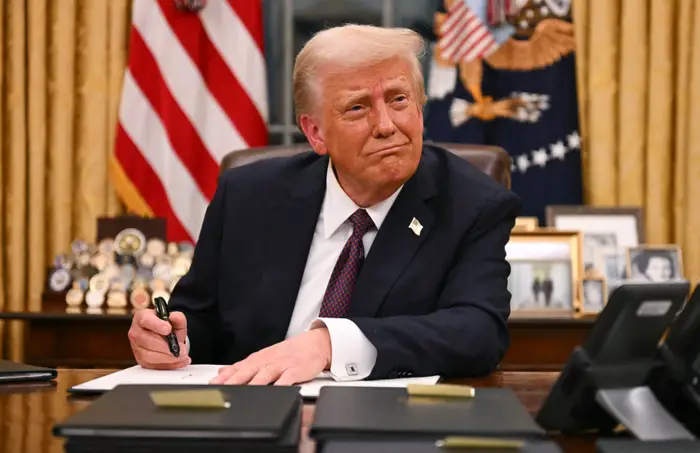In a move that is sure to reverberate across the globe, the United States Senate has approved former President Donald Trump’s request to cancel $9.4 billion in foreign aid. This decision, which affects countries from Africa to Asia and the Middle East, marks a significant shift in America’s approach to international assistance and raises deep questions about the nation’s commitment to global leadership and humanitarian responsibility.
The Genesis of the Request
Donald Trump’s request to slash foreign aid is not sudden or isolated. During his time in the White House, Trump made it clear that his vision for America was one of “America First.” He often criticized foreign spending, arguing that taxpayer dollars should be invested at home rather than abroad. This latest push to cut billions from the foreign aid budget is a continuation of that philosophy, and it now finds support in a Senate eager to align with his priorities.
The request targeted a broad range of programs: health, education, food security, and infrastructure projects in dozens of countries. To many, these cuts are seen as a retreat from America’s traditional role as a global leader and a benefactor. To others, it is a long-overdue correction, a move to focus on domestic priorities in a time of economic uncertainty.
The Human Impact
Behind every line in a federal budget is a human reality. The halt to $9.4 billion in foreign aid will have real-world consequences. In Africa, programs designed to fight malaria and HIV/AIDS will be affected. In war-torn regions, food and medical supplies could disappear. Schools, hospitals, and water projects in vulnerable communities may be left unfinished. The ripple effects of these cuts will be felt for years, potentially setting back decades of progress in global health, education, and poverty reduction.
For the people who depend on these programs, the loss of American aid is not just a policy change—it is a threat to their survival and well-being. Children may lose access to education. Families could face food shortages. Communities striving for stability may see their hopes dashed. The human cost of these cuts cannot be overstated.

The Political and Diplomatic Fallout
The Senate’s approval of the request is not just a domestic story; it is a diplomatic earthquake. Allies and partners around the world are watching closely, wondering what this means for their relationships with the United States. For decades, American aid has been a tool of soft power, building goodwill and fostering cooperation. Its reduction sends a clear signal: America is stepping back from its global responsibilities.
This move is likely to reshape alliances and partnerships. Countries that have relied on American support may look elsewhere for help. Rival powers, such as China and Russia, are already filling the vacuum, offering their own forms of aid and influence. The long-term implications for American leadership are uncertain, but one thing is clear: the world is taking notice.
“Foreign aid is not just charity; it’s a reflection of our values and our place in the world. Cutting it does not make us stronger—it makes us smaller.” — International development expert
The Domestic Debate
In Washington, the debate over foreign aid is fierce and polarized. Supporters of the cuts argue that charity begins at home. They point to rising inequality, crumbling infrastructure, and unaffordable healthcare as reasons to redirect funds. They see foreign aid as wasteful or even counterproductive, suggesting that it fosters dependency rather than independence.
Opponents, however, warn that withdrawing from the world is dangerous. They argue that foreign aid is not just about helping others, but about protecting American interests. Healthy, educated, and stable societies abroad are less likely to produce conflict, terrorism, or mass migration. Investing in global health and development, they say, is a form of preventive medicine for the planet.
The Broader Context
The Senate’s approval of Trump’s request comes at a time when the United States is reassessing its role in the world. After decades of leading international coalitions and humanitarian efforts, there is a growing sense of fatigue and self-doubt. The wars in Iraq and Afghanistan, the rise of populism, and the challenges of globalization have all contributed to a mood of retrenchment.
Yet, the world’s problems do not respect borders. Pandemics, climate change, and food insecurity are global challenges that require global solutions. By reducing its foreign aid commitments, the United States is not just saving money—it is withdrawing from the table at a time when leadership is needed most.
The Ethical Dimension
At its heart, the debate over foreign aid is a moral one. What obligations does a wealthy nation have to its neighbors in need? Is it acceptable to turn away from suffering when one has the means to help? The answers to these questions say much about a nation’s character and its vision of the future.
For advocates of foreign aid, the cuts are a betrayal of American ideals. They see generosity and compassion as core values, and believe that helping others is both a privilege and a responsibility. For critics, the cuts are a realistic adjustment to a world filled with domestic needs and limited resources.

Looking Ahead
The Senate’s decision to halt $9.4 billion in foreign aid will not be the end of the story. Humanitarian organizations, faith groups, and concerned citizens are already mobilizing to mitigate the impact. Some countries may step up their own aid programs. Others may seek new partnerships outside the traditional Western alliances.
For the United States, the move raises profound questions about national identity. Is America still a beacon of hope and a champion of the vulnerable? Or has it chosen a narrower, more self-interested path? The answers will shape not only America’s place in the world, but the world’s view of America.
Conclusion
The Senate’s approval of Donald Trump’s request to cancel $9.4 billion in foreign aid is a watershed moment—one that will be studied and debated for years to come. It is a story about money, priorities, and power, but also about values, empathy, and leadership. As America steps back, the world is watching and wondering what comes next.
Stay woke. Stay tuned. Stay with AKEWE NEWS.